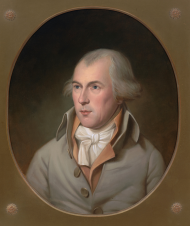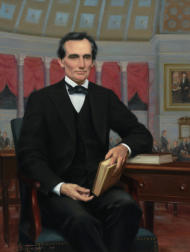Historical Highlight
House Members Who Became President or Presidential Candidates
 James Madison, Jr., Collection of the U.S. House of Representatives
James Madison, Jr., Collection of the U.S. House of RepresentativesAbout this object
Only Henry Clay (1824), James A. Garfield (1880), and John Anderson (1980) ran for President in the general election as sitting House Members. In Garfield’s case, the only successful instance of a sitting Representative becoming President, he had already been elected by the Ohio legislature to the U.S. Senate. Anderson ran as an independent challenger, and Clay’s candidacy predated the rise of the modern two-party system.
Note: Presidential campaigns where no former House Member ran or won are left blank.
| Election Year | Individual (House Service) | State | Party | Other Service |
|---|---|---|---|---|
| 2008 | John S. McCain III (1983–1987) | Arizona | Republican | Senator from Arizona (1987–present) |
| 2004 | ||||
| 2000 | Albert Gore, Jr. (1977–1985) | Tennessee | Democrat | Vice President of the United States (1993–2001) Senator from Tennessee (1985–1993) |
| 1996 | Robert J. “Bob” Dole (1961–1969) | Kansas | Republican | Senator from Kansas (1969–1996) Country attorney, Russell County, Kansas (1953–1961) Kansas House of Representatives (1951–1953) |
| 1992 | George H.W. Bush (1967–1971) | Texas | Republican | President of the United States (1989–1993) Vice President of the United States (1981–1989) Director, Central Intelligence (1976–1977) Chief liaison officer to the People’s Republic of China (1974–1976) Ambassador to the United Nations (1971–1973) |
| 1988 | George H.W. Bush (1967–1971) | Texas | Republican | President of the United States (1989–1993) Vice President of the United States (1981–1989) Director, Central Intelligence (1976–1977) Chief liaison officer to the People’s Republic of China (1974–1976) Ambassador to the United Nations (1971–1973) |
| 1984 | ||||
| 1980 | John Anderson (1961–1981) | Illinois | Republican | Independent candidate for president, 1980 |
| 1976 | Gerald R. Ford (1949–1973) | Michigan | Republican | President of the United States (1974–1977) Vice President of the United States (1973–1974) |
| 1972 | Richard M. Nixon (1947–1951) | California | Republican | President of the United States (1969–1974) Vice President of the United States (1953–1961) Senator from California (1951–1953) |
| 1972 | George McGovern (1957–1961) | South Dakota | Democrat | Senator from South Dakota (1963–1981) |
| 1968 | Richard M. Nixon (1947–1951) | California | Republican | President of the United States (1969–1974) Vice President of the United States (1953–1961) Senator from California (1951–1953) |
| 1964 | Lyndon B. Johnson (1937–1949) | Texas | Democrat | President of the United States (1963–1969) Vice President of the United States (1961–1963) Senator from Texas (1949–1961) National Youth Administration, Texas (1935–1937) |
| 1960 | John F. Kennedy(1947–1953) | Massachusetts | Democrat | President of the United States (1961–1963) Senator from Massachusetts (1953–1960) |
| 1960 | Richard M. Nixon (1947–1951) | California | Republican |
President of the United States (1969–1974) Vice President of the United States (1953–1961) Senator from California (1951–1953) |
| 1956 | ||||
| 1952 | ||||
| 1948 | ||||
| 1944 | ||||
| 1940 | ||||
| 1936 | ||||
| 1932 | ||||
| 1928 | ||||
| 1924 | John W. Davis (1911–1913) | West Virginia | Democrat |
Solicitor General of the United States (1913–1918) Ambassador to the Court of St. James (1918–1921) |
| 1924 | Robert M. La Follette (1885–1891) | Wisconsin | Republican | Progressive candidate for president, 1924 Senator from Wisconsin (1906–1925) Governor of Wisconsin (1901–1906) District attorney, Dane County, Wisconsin (1880–1884) |
| 1920 | James M. Cox (1909–1913) | Ohio | Democrat | Governor of Ohio (1913–1915, 1917–1921) |
| 1916 | ||||
| 1912 | ||||
| 1908 | William Jennings Bryan (1891–1895) | Nebraska | Democrat | Secretary of State (1913–1915) |
| 1904 | ||||
| 1900 | William Jennings Bryan (1891–1895) | Nebraska | Democrat | Secretary of State (1913–1915) |
| 1900 | William McKinley (1877–1883, 1885–1891) | Ohio | Republican | President of the United States (1897–1901) Governor of Ohio (1891–1896) |
| 1896 | William Jennings Bryan (1891–1895) | Nebraska | Democrat | Secretary of State (1913–1915) |
| 1896 | William McKinley (1877–1883, 1885–1891) | Ohio | Republican | President of the United States (1897–1901) Governor of Ohio (1891–1896) |
| 1892 | James B. Weaver, (1879–1881, 1885–1889) | Iowa | Greenbacker | Mayor of Colfax, Iowa (1901–1903) Populist candidate for president, 1892 National Greenback candidate for president, 1880 |
| 1888 | ||||
| 1880 | James A. Garfield (1863–1880) | Ohio | Republican | President of the United States (1881) Senator-elect from Ohio (1880) |
| 1876 | Rutherford B. Hayes (1866–1867) | Ohio | Republican | Governor of Ohio (1868–1872, 1876–1877) |
| 1872 | Horace Greeley (1848–1849) | New York | Whig | Democratic and Liberal Republican candidate for president (1872) |
| 1868 | ||||
| 1864 | Abraham Lincoln (1847–1849) | Illinois | Whig | President of the United States (1861–1865) Illinois house of representatives (1834–1842) |
| 1864 | Andrew Johnson (1843–1853)2 | Tennessee | Democrat | President of the United States (1865–1868) Vice President of the United States (1865) Senator from Tennessee (1857–1862; 1875) |
| 1860 | Abraham Lincoln (1847–1849) | Illinois | Whig | President of the United States (1861–1865) Illinois house of representatives (1834–1842) |
| 1860 | Stephen A. Douglas (1843–1847) | Illinois | Democrat | Senator from Illinois (1847–1861) Illinois house of representatives (1836–1837) |
| 1860 | John C. Breckinridge (1851–1855) | Kentucky | Democrat | Confederate Secretary of War (1865) General, Confederate Army (1861–1865) Senator from Kentucky (1861) Vice President of the United States (1857–1861) Kentucky house of representatives (1849) |
| 1860 | John Bell (1827–1841) | Tennessee | Whig | Speaker of the House (1833–1835) |
| 1856 | James Buchanan (1821–1831) | Pennsylvania | Democrat | President of the United States (1857–1861) Minister to Great Britain (1853–1856) Secretary of State (1845–1849) Senator from Pennsylvania (1834–1845) Minister to Russia (1832–1834) Pennsylvania house of representatives (1814–1815) |
| 1856 | Millard Fillmore (1833–1835, 1837–1843) | New York | Whig | American candidate for president, 1856 President of the United States (1850–1853) Vice President of the United States (1849–1850) New York state comptroller (1847–1849) New York state assembly (1829–1831) |
| 1852 | Franklin Pierce (1833–1837) | New Hampshire | Democrat | President of the United States (1853–1857) Senator from New Hampshire (1837–1842) New Hampshire state general court (1829–1833) |
| 1848 | ||||
| 1844 | James K. Polk (1825–1839), Speaker of the House (1835–1839) | Tennessee | Democrat | President of the United States (1845–1849) Governor of Tennessee (1839–1841) Tennessee house of representatives (1823–1825) |
| 1844 | Henry Clay (1811–1814, 1815–1821, 1823–1825), Speaker of the House (1811–1814, 1815–1821, 1823–1825) | Kentucky | Jeffersonian Republican | Secretary of State (1825–1829) Senator from Kentucky (1806–1807, 1810–1811, 1831–1842, 1849–1852) Kentucky house of representatives (1803, 1808–1809) |
| 1840 | William Henry Harrison (1816–1819) | Ohio | Jeffersonian Republican | President of the United States (1841) Minister to Columbia (1828–1829) Senator from Ohio(1825–1828) Ohio state senate (1819–1821) General, U.S. Army (1812–1814) Governor of Indiana Territory (1801–1813) Delegate, Northwest Territory (1799–1800) |
| 1840 | John Tyler (1816–1821)3 | Virginia | Jeffersonian Republican | |
| 1836 | William Henry Harrison (1816–1819) | Ohio | Jeffersonian Republican | President of the United States (1841) Minister to Columbia (1828–1829) Senator from Ohio(1825–1828) Ohio state senate (1819–1821) General, U.S. Army (1812–1814) Governor of Indiana Territory (1801–1813) Delegate, Northwest Territory (1799–1800) |
| 1836 | Daniel Webster, of (1813–1817), Federalist/Administration of Massachusetts (1823–1827) | New Hampshire | Federalist | Secretary of State (1841–1843, 1850–1852) Senator from Massachusetts (1827–1841, 1845–1850) |
| 1832 | Henry Clay (1811–1814, 1815–1821, 1823–1825), Speaker of the House (1811–1814, 1815–1821, 1823–1825) | Kentucky | Jeffersonian Republican | Secretary of State (1825–1829) Senator from Kentucky (1806–1807, 1810–1811, 1831–1842, 1849–1852) Kentucky house of representatives (1803, 1808–1809) |
| 1828 | Andrew Jackson (1796–1797) | Tennessee | Jeffersonian Republican | President of the United States (1829–1837) Governor, Florida Territory (1821) General, U.S. Army (1814–1821) Tennessee supreme court (1798–1804) Senator from Tennessee (1797–1798, 1823–1825) |
| 1828 | John Quincy Adams (1831–1848) | Massachusetts | Whig | President of the United States (1825–1829) Secretary of State (1817–1825) Minister to Great Britain (1815–1817) Minister to Russia (1809–1814) Senator from Massachusetts (1803–1808) Massachusetts state senate (1802–1803) Minister to Prussia (1797–1801) Minister to Portugal (1796–1797) Minister to the Netherlands (1794–1796) |
| 1824 | John Quincy Adams (1831–1848) | Massachusetts | Whig | President of the United States (1825–1829) Secretary of State (1817–1825) Minister to Great Britain (1815–1817) Minister to Russia (1809–1814) Senator from Massachusetts (1803–1808) Massachusetts state senate (1802–1803) Minister to Prussia (1797–1801) Minister to Portugal (1796–1797) Minister to the Netherlands (1794–1796) |
| 1824 | Andrew Jackson (1796–1797) | Tennessee | Jeffersonian Republican | President of the United States (1829–1837) Governor, Florida Territory (1821) General, U.S. Army (1814– Tennessee supreme court (1798–1804) Senator from Tennessee (1797–1798, 1823–1825) |
| 1824 | Henry Clay (1811–1814, 1815–1821, 1823–1825), Speaker of the House (1811–1814, 1815–1821, 1823–1825) | Kentucky | Jeffersonian Republican | Secretary of State (1825–1829) Senator from Kentucky (1806–1807, 1810–1811, 1831–1842, 1849–1852) Kentucky house of representatives (1803, 1808–1809) |
| 1820 | ||||
| 1816 | ||||
| 1812 | James Madison (1789–1797) | Virginia | Jeffersonian Republican | President of the United States (1809–1817) Secretary of State (1801–1809) Virginia ratification convention (1788) Federal Convention (1787) Continental Congress (1780–1783, 1787–1788) Virginia executive council (1778) Virginia general assembly (1776, 1799) |
| 1808 | James Madison (1789–1797) | Virginia | Jeffersonian Republican | President of the United States (1809–1817) Secretary of State (1801–1809) Virginia ratification convention (1788) Federal Convention (1787) Continental Congress (1780–1783, 1787–1788) Virginia executive council (1778) Virginia general assembly (1776, 1799) |
| 1804 | ||||
| 1800 | ||||
| 1796 | ||||
| 1792 | ||||
| 1788 |
Footnotes
1With the exception of Andrew Johnson and John Tyler, who became President through presidential succession, only successful candidates in individual elections are in bold.
2Succeeded Abraham Lincoln after his assassination on April 14, 1865.
3Succeeded William Henry Harrison after his death on April 4, 1841.












